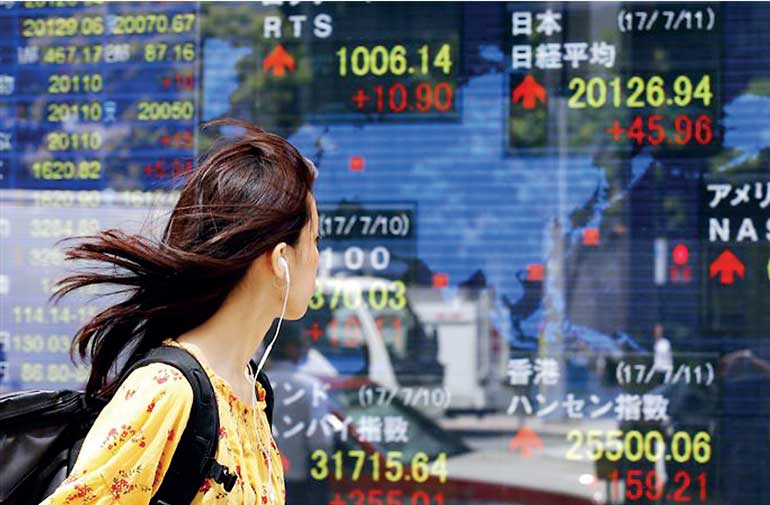Sunday Feb 22, 2026
Sunday Feb 22, 2026
Friday, 2 February 2018 00:00 - - {{hitsCtrl.values.hits}}
 Tokyo (Reuters): An index of Asian shares swung into negative territory on Thursday, erasing earlier gains, as a late retreat in Chinese stocks pulled the benchmark lower and as concerns about rising interest rates softened investor sentiment.
Tokyo (Reuters): An index of Asian shares swung into negative territory on Thursday, erasing earlier gains, as a late retreat in Chinese stocks pulled the benchmark lower and as concerns about rising interest rates softened investor sentiment.
MSCI’s broadest index of Asia-Pacific shares outside Japan was down 0.3%, still wobbly after Tuesday’s 1.4% fall, and pulling away from earlier increases.
On Wednesday, the US Federal Reserve flagged interest policy tightening later this year and upgraded its inflation outlook at its policy meeting, its first in 2018 and last to be chaired by Janet Yellen, who will be replaced by governor Jerome Powell on Feb 3. It kept interest rates on hold as expected.
In China, profit-taking ahead of the Lunar New Year holidays in mid-February, led to a correction, with Shenzhen shares shares hit the hardest, falling more than 3% to 6 1/2-month lows.
“Investors are sensitive to medium and small stocks which do not have strong fundamentals as negative news in the market curbed their risk appetite and offered them an excuse to sell some shares,” said Ben Kwong, Chief operating officer at KGI Asia in Hong Kong.
Earlier on Thursday, Caixin/Markit Manufacturing Purchasing Managers’ Index, a private business survey, came at 51.5, matching December’s reading, which was the highest in four months, showing growth in China’s manufacturing sector remained elevated in January.
Japan’s Nikkei, a major underperformer in the past couple of weeks, rose 1.7% from a four-week low hit the previous day.
US S&P 500 mini futures gained 0.3% in Asian trade on Thursday, helped by 1.4% gains in Facebook in after-hours trading following the company’s solid earnings.
European shares are expected to track the gains, with spread-betters seeing a high opening of 0.3% in Britain’s FTSE, Germany’s Dax and France’s Cac.
Later in the day, three US tech giants, Apple, Google parent Alphabet and Amazon.com will announce earnings.
Investors have been expecting strong profit growth in U.S. firms due to sound global growth, with US President Donald Trump’s tax cuts seen giving an additional boost to Corporate America’s bottom line.
Economic data released overnight underscored the strength of the global economy. ADP payrolls data in the United States showed job increases of 234,000 in January, 49,000 more than economists’ forecast.
“The US is cutting tax and spending $1.5 trillion in infrastructure when the economy is really strong. There would be little wonder if the economy overheats,” said Norihiro Fujito, senior investment strategist at Mitsubishi UFJ Morgan Stanley Securities.
For a growing number of investors, the biggest worry now is that the economy may accelerate too fast, lifting inflation and prompting central banks to tighten their monetary policy faster.
The yield on the 10-year US Treasury note - the benchmark for world lending - briefly shot up to 2.754%, a level last seen in April 2014. It last stood at 2.725%.
Investors’ inflation expectations have also risen to 3 1/2-year high of 2.12% based on the so-called breakeven inflation (BEI) rate calculated by the gap between conventional bonds and inflation-protected bonds.
US interest rate futures are now pricing in almost three rate hikes this year, compared to twice at the start of year, with some now talking about the possibility of four rate hikes.
“The dollar’s weakness and higher oil prices are boosting inflation expectations in the United States, which in turn is boosting US bond yields,” said Shuji Shirota, head of macroeconomic strategy at HSBC Securities.
On Wall Street on Wednesday, the S&P 500 erased earlier gains to end almost flat, up 0.05% at 2,823.81. The Dow Jones Industrial Average was up 0.28%, however, most of the benchmark’s gains were driven by a 4.9% rise in index heavyweight Boeing following its strong earnings. Stripping out Boeing’s rally, the index would have been down 0.18%.
Although rising US yields lent some support for the dollar, the US currency lacked momentum as investors are focusing more on a fresher theme of exit from stimulus in other economies, such as the euro zone.
The euro traded at $ 1.2420, consolidating after having hit a 3-year high of $ 1.2538 hit on 25 January, as investors bet the European Central Bank will be laying the groundwork for ending its asset purchase and raising interest rates.
The dollar changed hands at 109.33 yen, bouncing off a four-month low of 108.28 hit on Friday.
The British pound fetched $ 1.4200, after a 5.1% gain in January, its biggest since May 2009, owing to broad dollar weakness and expectations of a Brexit deal more favourable to the UK.
The Chinese yuan is also strengthening, with the Thomson Reuters/HKEX Global CNY index, rising to 97.14, its highest level since June 2016, having risen 4.7% from its May 2017 low of 92.76.